- Home
- Stephen Hunt
Foul Tide's Turning Page 5
Foul Tide's Turning Read online
Page 5
‘I’ve got a strong pair of legs and some shoe leather that hasn’t been worn through yet,’ said Tom. ‘That’s the only qualification you need to be a guild courier.’
When Jacob returned to his rectory after the last service of the day, he discovered Brother Frael waiting patiently outside, visiting once more from the old monastery in the mountains. It had been Jacob’s home too, an age ago; its serene heights perched over an almost endless view across the Lancean Ocean’s jade-coloured deeps. Brother Frael seemed to bring the scent of the ocean with his humble slate-coloured habit. Below his tonsured hair – a ring of greyed silver like a low-sat halo – lay a pallid but affable face, his cheeks stretched waxen by sun and wind. Like many of the brothers and sisters from the border orders, Brother Frael had a touch of the Rodalian about him: wide, knowing eyes and soft manners combined with a somewhat candid nature. The old man was kindly enough, but his appearance was frequently the foreshadowing of a storm; though if Jacob had been in a better mood, he might have said the monk often appeared to sweep up the pieces of Jacob’s life.
‘I hear you have been vexing the bishop,’ said Frael.
‘That’s a man easily vexed,’ noted Jacob. He unlocked the door to the rectory. The tiny splinter of wood he had left jammed in the frame tumbled to the doorstep. Alone, then. Just me and my visiting conscience. ‘I don’t think Kirkup sits comfortable with the fact that, as the pastor of Northhaven, my name should have automatically been considered for the seat he occupies.’
‘Such a nice new shiny seat,’ said the monk, standing up and entering the hall. ‘But an easy mistake to make. When you left to pursue the slavers, the Synod in Arcadia thought you as good as dead. For that matter, so did the order.’
‘Happy to disappoint,’ said Jacob.
‘Sadly, the bishop is not the only one disappointed,’ said the monk. ‘When the order discovered you lying half-dead on the beach all those years ago, surrounded by corpses and driftwood, our healing of you went far beyond your shattered body. You were almost dead, but in the end you were reborn. It was as much a miracle as any I have seen, heard, or read of. You came into our order as one soul and left as another.’
‘I’m still the same man,’ said Jacob.
‘I wish that were true.’ The monk indicated the pair of belted pistols hanging in the hall. ‘Those are not our tools. You should have left them buried in that false grave outside.’
‘These are dangerous times,’ said Jacob. He took the monk’s simple wooden begging bowl out of the man’s hands. ‘I’m not sure how far I would have travelled on that journey shaking one of these. I’d better fill it for you, though. I’m not sure how many others around the town will honour the old hospitality of salt and roof. Many people still feel forsaken after the raid. By the lords down here and the saints up there.’
‘Blood begets blood,’ warned Brother Frael. ‘I watched you reclaim your old guns from that coffin. I watched you dig them out, unroll them, strap them on before leaving to save Carter and the other children taken by the slavers. I said nothing then. Well, Carter is safe at home again. Is it not time to rebury those hideous instruments in the dirt?’
‘You said plenty, as I recall. Carter is home, but safe …?’ said Jacob. ‘Which of us can say that? That damn usurper of a king down in Arcadia is less than happy I returned with a member of his family with a better claim to the throne than his, or that we’ve made a lie of the story that Northhaven was sacked by the usual pirates from across the water.’
‘When has there not been trouble in this world?’ said the monk. ‘Princes who want to be kings and kings who want to be emperors. Bandits who want to be rich and nomads who want to be conquerors at the head of a horde. There is only one choice to make in this life. Whether you are to fight or whether you are to walk away.’
‘Sometimes the fight comes to you,’ said Jacob. ‘No matter how many cheeks you turn, it comes for you and keeps on coming.’
‘Those are not your tools,’ insisted the brother, turning away from the twin pistols. ‘They are Jake Silver’s. Let that man rest, as dead as the thousands he slaughtered.’
‘I left my guns below the dirt once,’ said Jacob. ‘What peace did it buy me? My first two children taken by the plague, my town fired, my wife murdered by the skels, and my last son stolen to be a beast of burden and treated worse than any animal by the Vandians. I watched helpless. Jacob Carnehan couldn’t save them. But Jake Silver could have. Except he was gone. Hiding under this.’ Jacob pulled off his priest’s collar from his shirt and hurled it angrily down to the floorboards.
‘And would Mary Carnehan have wanted such a path for you?’
‘She’s dead,’ said Jacob. ‘She doesn’t want anything.’
‘Is that true?’
Jacob reached out to hang on to the banister of the staircase. He couldn’t walk into a room in the rectory without seeing her ghost. Feeling her presence. But his wife never whispered to him anymore; not like she had on the journey to rescue Carter. Maybe rescuing Carter brought her shade to peace? ‘True enough, Brother.’
‘This is not your punishment, Jacob,’ said Brother Frael. ‘Neither God nor his saints are so cruel.’
Maybe it only feels like it. ‘It’s not His vengeance I fear is coming upon us,’ said the pastor, ‘but a more temporal power.’
‘And how many graves do you intend to fill with your revenge?’ asked the monk, sadly. ‘How many will it take to punish those who slew your pretty wife and burned your beautiful town?’
‘And buried half my parishioners. If we’re keeping count, let’s not forget all our dead friends out there where my guns used to lie. All those good people whose houses you used to rattle your begging bowl in front of. Weyland is as wide as it is tall,’ said Jacob, ‘I reckon we’ve got space for a few extra tombstones, as long as the right boots get to fill them.’
‘And will you choose the feet inside those boots?’
‘No,’ sighed Jacob. ‘I reckon they’ll more or less select themselves when it comes to it.’ At least, that’s how it’s been working to date.
‘Put Weyland behind you,’ urged Brother Frael. ‘Cross the border and return to the monastery with me.’
‘If I do, trouble will only follow me,’ said Jacob. ‘I can promise you that.’
‘Our deaths are the rapids which await each of us behind the final bend of life’s course. All a mortal may navigate is how we choose to meet our end. The order’s offer is not unconsidered of the dangers your presence would bring. When death comes, let us meet it serenely. Let us meet it mindfully together, without fear.’
‘My fate isn’t something I can discard behind me like some old coat. I’ll never forget what you did for me. How the order saved me … and I won’t be the misbegotten soul who brings destruction down on Geru Peak. I forgot the world for nigh on twenty-five years, but it remembered me in the end. It stole into Northhaven and took everything from me.’
‘If you believe that, then perhaps it has taken everything.’
Jacob reached out, feeling the reassuring heft of the ivory-handled pistols. No, not quite everything. Six reasons apiece in each pistol’s rotating chamber; that made twelve reasons for going on. ‘I don’t fear death, Brother.’
‘Then you fear something worse. You fear life.’
‘Fear it?’ Jacob snorted. ‘I don’t even feel it anymore.’
‘Is that not precisely why you must return with me?’
‘A foul tide is washing in, brother,’ said Jacob. He walked from the hall into the pantry in search of a meal for the monk. Something for Frael to take on the road with him, for the brother wouldn’t want to spend the night under this roof after he’d heard what the pastor had to say. ‘Jacob Carnehan can’t turn it. But I figure Jake Silver is a man who might.’
‘There are always stealers ready to worm into our soul and hollow it out from the inside,’ said the monk. ‘Please—’
‘Maybe I could turn and run,’ said Jac
ob. ‘Forget who I am – was – again. But could my son? Could the woman he loves? Could the hundreds of Weylanders who escaped the sky mines as slaves? Is your monastery big enough to hold everyone in the whole nation? Because that’s where this particular cart is rattling.’
‘I can only save one soul at a time.’
‘Then save someone else’s,’ said Jacob. ‘Because I’m never going to lose my son again.’
‘If you plunge down this path you surely will, and take how many other widows and widowers with you?’
Jacob handed back the bowl, full of salt meat and dried fruits. ‘I’ve filled your bowl, Brother. Let fate fill its own as it will. I’m not going to run and hide and watch like a coward for a second time.’
‘Then you’ve chosen.’
‘Life’s chosen for me, old friend. Fate’s chosen.’ Jacob raised his hands open. ‘I’m just here waiting on the tide.’
‘Fare you well then, Quicksilver. It seems my brother has already departed.’
Eleanor Kaylock stared back up the hill’s stepped grass slope. The windows of the big house were orange with lamp light, warm and inviting compared to the biting cold outside. Hedges ran up either side of the hill, carefully trimmed to resemble ramparts in shape and size. They made the manor house up high look even more like a castle. Rows of trees behind the hedge stood sentry, bare of leaf and dark branches iced with snow. The maid touched the pocket of her coat to make sure she still had the envelope given to her by Willow Landor. Of course it was there. She’d hidden it inside her room in the manor house until the end of the day came and then retrieved it. Calling on the church for help and succour, or at least calling on the old dog-grizzled pastor? Well, it was probably marginally more fruitful than sending for the constables in the old town. The High Sheriff of Northhaven might not be related to Benner Landor by blood, but he knew which side his bread was buttered on, that much was certain. Eleanor comforted herself with the fact that the pastor’s son was genuinely in love with Willow … for reasons that didn’t have anything to do with the fortune she stood to inherit – not that there’d be any money for either of them if Willow defied her old man. Eleanor rubbed her stomach with her gloves. Not until they had some grandchildren to soften him up a bit. Then, the old fool wouldn’t much care if Willow Landor was married to the pastor’s son or the Grand Duke of Dedovo.
Eleanor reached the frozen river and picked up a stone from the bank that hadn’t been concealed by the snow; bring it cracking down hard on the surface. Good. Strong enough to have gone ice skating under the bright full moon if she’d brought a pair of wooden blades. Tentatively, Eleanor tried to keep her footing on the ice as she edged across towards the opposite bank. She was perhaps a quarter of the way across when she heard an odd humming at her rear. ‘Keep a little songbird, feed a little songbird.’ She glanced behind her. Eleanor started at the sight of the mistress’s short, ugly manservant, lurking under the weeping willows. What in the name of the saints was he doing all the way at the grounds’ borders … ice fishing in the dark?
‘I was heading to my father-in-law’s farm. It’s quicker this way,’ spluttered Eleanor.
‘You want to be careful, petal. That river ice is mighty thin.’
‘In a midwinter freeze?’ said Eleanor. ‘It’s as thick as the walls of the house.’
Nocks leaned forward and she saw what he had been hiding behind his back. A heavy short sabre. What was the devil’s intent – did he meant to give her a poke, or worse, skewer her?
‘Please, I’m carrying my husband’s child.’
‘Are you sure that’s all?’ Nocks had the blade out in a second, driving it’s sharp point manically into the river’s frozen surface, the scar cleaving his features throbbing as vividly as a devil’s vein as he laid into the ice. Eleanor stumbled desperately for the safety of the opposite riverbank, trying to stay upright, but cracks in the ice rippled out, flowing below her boots, and suddenly she wasn’t standing on a solid surface anymore, but falling through a bobbing tear of crumbling ice shards, the shock of the freezing water so intense it was like slamming into a wall. The water here on the bend was shallow, hardly higher than her hips, but the current trapped below was dragging at her with the full force of a train of horses. She clawed with her fingers at the remaining ice sheet, desperately struggling for enough purchase to resist the force of water trying to drag her under. Nocks reached out and for a fleeting moment Eleanor thought he was trying to help her escape, but he merely tapped his blade against the sheet, as though measuring the distance between her and the river bank. ‘You see, petal, when I was listening at the door, I swear I heard you agreeing to carry something to Jacob Carnehan and his young buck.’
‘Help me! Don’t let me freeze!’
‘Bit late for that,’ grinned Nocks. ‘But don’t worry; you’ll drown long before the cold finishes you off. And I think Miss Haughty back at the house is due a proper lesson in submission. You’re the first part of it. The second part will be a lot more fun. At least, I plan to make it fun for me.’
Eleanor tried to scramble up onto the sheet, but it started to disintegrate under her weight. She was so numb; she couldn’t feel a thing below the waist anymore. What was this doing to her unborn baby? ‘Please!’
‘I’m doing a kindness for your man, saving him all those sleepless nights. He’d thank me if this wasn’t to be anything other than a tragic accident. He’s going to remember you how you were before you swell up as wide as a whale.’
‘It’s only a message,’ pleaded Eleanor, trying to think of something, anything, she could say to make this foul piece of human flotsam save her life.
‘And this is mine!’ snarled Nocks. He lashed out with the flat of his blade, striking her fingers with enough blunt force that she screamed, her grip abandoned. The instant Eleanor let go, the river yanked her downstream, striking her head against the sheet, and then she was sucked away, whirling in the darkness, banging uselessly on the wrong side of the ice, a muffled, useless thumping that got weaker and weaker until the bubbles of air obscuring her view slid away, replaced by cold darkness.
THREE
QUADRATICS WITH THE
FOREST FOLK
Pah, another morning in paradise. Lady Cassandra Skar might have been one of the Vandian emperor’s numerous grandchildren, daughter of an imperial house and heir to more riches, land and vassals than most people could count but, sadly for her, her exalted status meant nothing to the creatures keeping her hostage. She wasn’t even sure these people of the forests, these gasks, had money. Not amongst themselves, anyway, to be used in the hidden deep woodland city of Quehanna. Perhaps to trade with the common pattern people beyond the green cathedral vaults of their pines; neighbours her ever-present minder, Sheplar Lesh, had to be counted among. The gasks were a nation of many contradictions. The twisted men and women were outwardly peaceful to the point of somnolence – avowed pacifists – but when roused, provoked, they could fire the spines that covered their leathery hides with all the speed, accuracy and lethality of a rifle. She had seen it for herself. During the slave revolt, the battle fought in the shadow of the great stratovolcano and the sky mines, a single gask slave had launched itself at the waves of imperial guardsmen, turning the air around its death dance into a dark cloud of fleeting spines, each spine tipped in natural neurotoxins that sent her loyal fighters’ bodies twitching and twisting to the ash to spasm their last breaths away. That wasn’t the only contradiction of the gasks’ society. They lived in the forest, seeming to do without most of the trappings of high civilization enjoyed by the Vandians – not even the barbarian stone buildings and crude society of the nearby Weylanders. Yet when they chose to, the gasks could produce miniature machines of such delicacy and advanced technology, that, in many ways, they rivalled those fashioned by the empire’s scientists. It was as though you were watching a drunk painted savage dancing around a fire stop, fiddle with his spear, and suddenly flourish an automatic rifle conjured from twigs and mud
. Frankly, given the gasks’ dangerous temper, she did not want to test their nation by offering them physical violence, even though the likelihood was that when she escaped, she would have to. That point was fast approaching. She had waited to be ransomed. And waited. And then waited some more. What, she asked herself, was the point of being taken hostage if you weren’t going to be ransomed? Isn’t that why foreigners seized notables like Cassandra as hostages? To be honest, given that it was a ragtag bunch of escaped slaves who had carried Lady Cassandra away, she was more than a little surprised they hadn’t burnt her at the stake or had her skinned alive out of revenge. It was the fate the emperor would certainly have arranged for any of their number taken alive. With countless slaves in the imperium, not to mention hordes of lower-caste citizen rabble thronging their cities, strong messages needed to be sent that there was no escape for the empire’s living property, and that rebellion only led to certain death. So, not executed; not ransomed? At least, not yet. She could add the reasons for her captivity to the list of things she still didn’t understand … such as how she had arrived here?
Lady Cassandra had absorbed the blast of an exploding shell during the revolt and been knocked unconscious. Delirious and concussed for a few weeks. But that should have placed her location firmly within the empire’s boundaries, not here. This was the slaves’ homeland, millions of miles away. Territory that should only be reachable in any reasonable timescale using an imperial warship driving onward at full thrust. Even travelling on a merchant aircraft at high altitude, riding the fierce trade winds, Vandia was a decade or so of non-stop rotor-engined flight away. She knew she was in Weyland. Many of the slaves working in her sky mine had been harvested from this state over the years. And she had also learnt that she was being held in the north of Weyland, bordering a mountainous land called Rodal. Her clumsy, stupid minder, Sheplar Lesh, came from Rodal. But could Cassandra find Weyland on a map? Of course not. Weyland was just one of countless thousands of faraway states between here and the imperium. It would require a lifetime working as an imperial geographer to even attempt to commit the route home to memory. Cassandra’s present distance from home was no accident, of course, but a matter of imperial policy. You didn’t raid your immediate neighbours for slaves; neighbouring states gave people willingly as tribute in return for resources. No. Pissing on your own doorstep was never a good idea. Especially not when you possessed brutal proxy forces like the skel slavers, willing to absorb the locals’ animosity for the attacks, allies who would sell human cargoes on to the empire. Had the slave revolt ended in the rebellious sky miners seizing a Vandian vessel and escaping back to the lands they’d been harvested from? It seemed unlikely, yet here she most certainly was. And, as worrying as Cassandra found the prospect of how mere slaves had returned home so easily, she presently faced the far more pragmatic anxiety of how she’d travel home after she escaped? The best option she had come up with so far was to try to make contact with the empire’s agents who should be working here. Have them use their secret radio network to send for a warship. Cassandra knew that the imperium’s standard methodology for harvesting human flesh was to bribe a local barbarian warlord to look the other way while the skels raided and seized those young enough to survive the rigours of a lifetime of imperial service. Some primitive ruler around here was no doubt growing fat on imperial gold and silver. But she could hardly escape this forest and walk the streets of the barbarians’ capital wearing a sign saying ‘Kidnapped Vandian celestial-caste royal: large reward offered for return home,’ until she happened across a barbarian on the empire’s payroll.

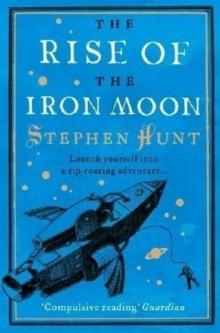 The Rise of the Iron Moon
The Rise of the Iron Moon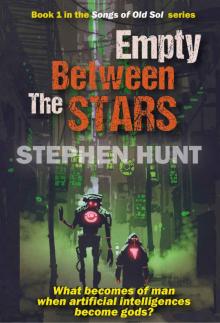 Empty Between the Stars (The Songs of Old Sol Book 1)
Empty Between the Stars (The Songs of Old Sol Book 1)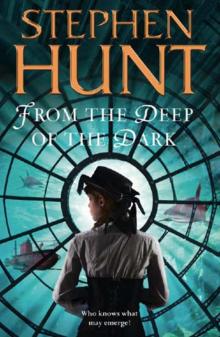 From the Deep of the Dark
From the Deep of the Dark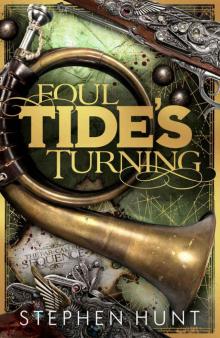 Foul Tide's Turning
Foul Tide's Turning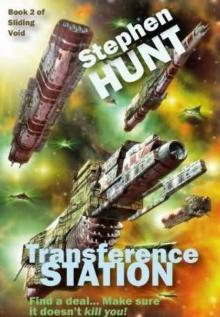 Transference Station
Transference Station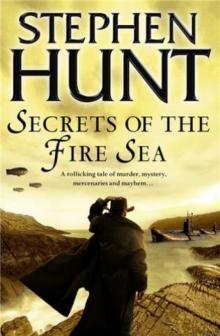 Secrets of the Fire Sea j-4
Secrets of the Fire Sea j-4 Void All The Way Down: The Sliding Void Omnibus
Void All The Way Down: The Sliding Void Omnibus The Kingdom Beyond the Waves j-2
The Kingdom Beyond the Waves j-2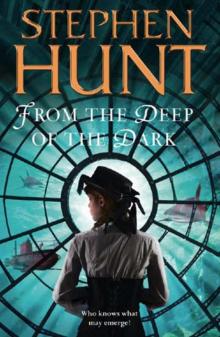 From the Deep of the Dark j-6
From the Deep of the Dark j-6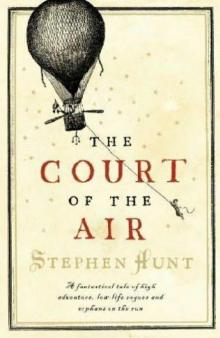 The Court of the Air
The Court of the Air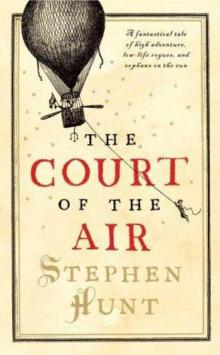 The Court of the Air j-1
The Court of the Air j-1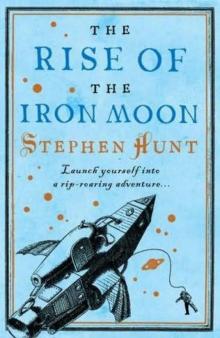 The rise of the Iron Moon j-3
The rise of the Iron Moon j-3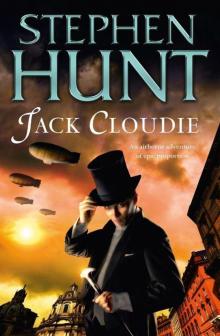 Jack Cloudie j-5
Jack Cloudie j-5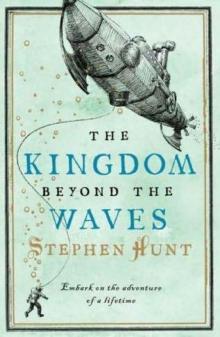 The Kingdom Beyond the Waves
The Kingdom Beyond the Waves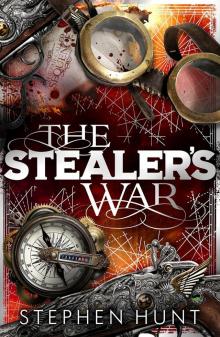 The Stealers' War
The Stealers' War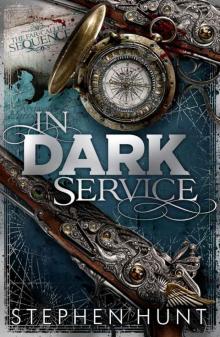 In Dark Service
In Dark Service